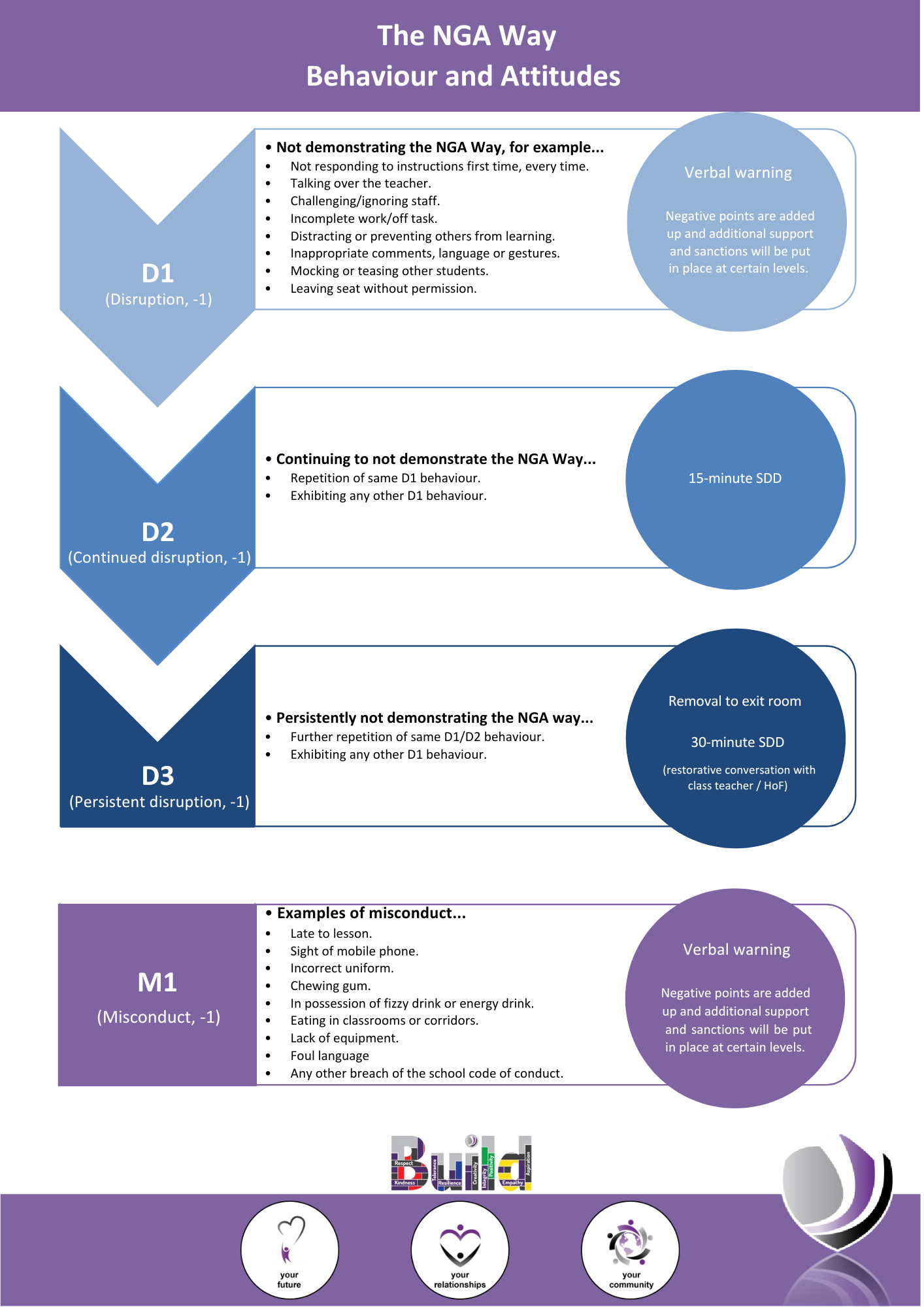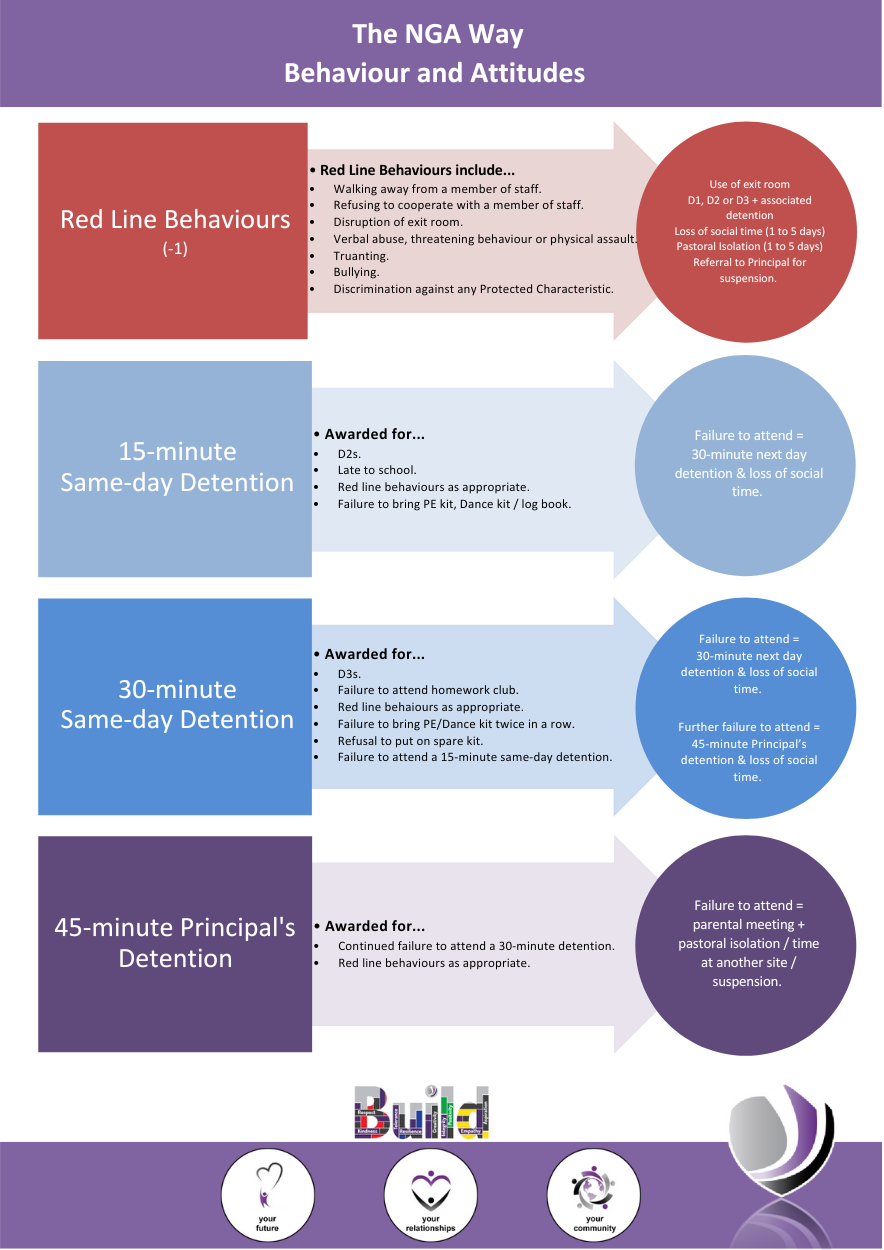Behaviour
Our Principles
We believe that holding high expectations of how pupils should behave and conduct themselves is essential. We also understand that, in collaboration with parents and carers, part of our job is to teach pupils how to achieve them. Our default method for achieving this is through positive reinforcement. However, sanctions will also be used to reinforce expectations when they are not being met.
To achieve this, we have:
• The safety, well-being, and education of each pupil as our priorities.
• High expectations which are clearly communicated to pupils, parents and staff via assemblies, letters, noticeboards, tutor time notices, pupil planners and the website.
• Clear procedures and systems to ensure effective and timely recording and sharing of information.
Responsibilities
All staff are responsible and accountable for reinforcing the Academy’s high expectations and ensuring any rewards, sanctions and interventions are appropriate, timely and consistent with this policy.
Our focus is to encourage positive behaviours and attitudes. Staff will do so by using praise, recognition, and rewards.
Where negative behaviour or attitudes are evident, we will seek to clarify our expectations with the pupil and give them an opportunity to demonstrate the appropriate behaviour and attitude.
However, when negative behaviour and attitudes persist, or when a pupil disrupts the learning of other pupils, deliberately upsets, mistreats, or harms a member of the school community or its fabric, or demonstrates intolerance for someone with a protected characteristic we will apply sanctions to reinforce our expectations.
When pupils behave inappropriately, teachers will respond with a cool and calm response. Teachers should save their emotion, passion, enthusiasm, and excitement for when it has most impact - when pupils behave appropriately. Setting the scene for positive behaviour is key.
Key Questions for Teachers
- Have I planned my lesson appropriately and are pupils clear what they are learning, what they are doing to demonstrate that learning and why?
- Am I praising and rewarding those who behave and work hard?
- Is the work relevant, challenging, and interesting enough to engage pupils in learning?
- Are the needs of all learners planned and catered for?
- Are the resources appropriate and readily available so that pace is maintained?
- Is my seating plan right and have I made my expectations clear?
- Have I taken control of the class on entry, during the lesson and at the end of the lesson?
Positive Role Modelling
In order to create a positive, welcoming atmosphere, teachers will aim to be at the door, smile, and be enthusiastic about working with the pupils and about the content/context of the lesson. When pupils are having difficulty, teachers will discuss how successful learners deal with their frustrations and create a calm atmosphere. Consideration will be given to Spiritual, Moral, Social and Cultural issues and how developing the ‘big picture’ with pupils allows them to think outside the box.
Consistency
Pupils respond positively to routine and predictable, reliable, consistent patterns. All teachers will ask pupils to follow a set of clear routines at the start and end of every lesson and use the NGA Way to inform effective teaching practice and behaviour management.
Leadership and Management
The Principal will make the final decision on sanctions for behaviour.
The Senior Leadership Team (SLT) will investigate incidents that occur, discuss them with pastoral teams to ensure there is a holistic approach, and make recommendations to the Principal regarding sanctions, restorations, and support.
The senior leader with responsibility for Behaviour and Attitudes (Mrs Turner-Ramadan), will review behaviour processes and policies directly with the Principal.
A member of SLT oversees each year group and will work directly with their pastoral team to ensure pupils are abiding by our code of conduct and given support where it is required.
Each Head of Year (HoY) is responsible for the pupils in their year group and each Head of Faculty (HoF) is responsible for support and intervention within their subjects. All parties triangulate information, along with parent and pupil voice to support each pupil’s individual needs.


|
Next: Rewards and Recognition |

